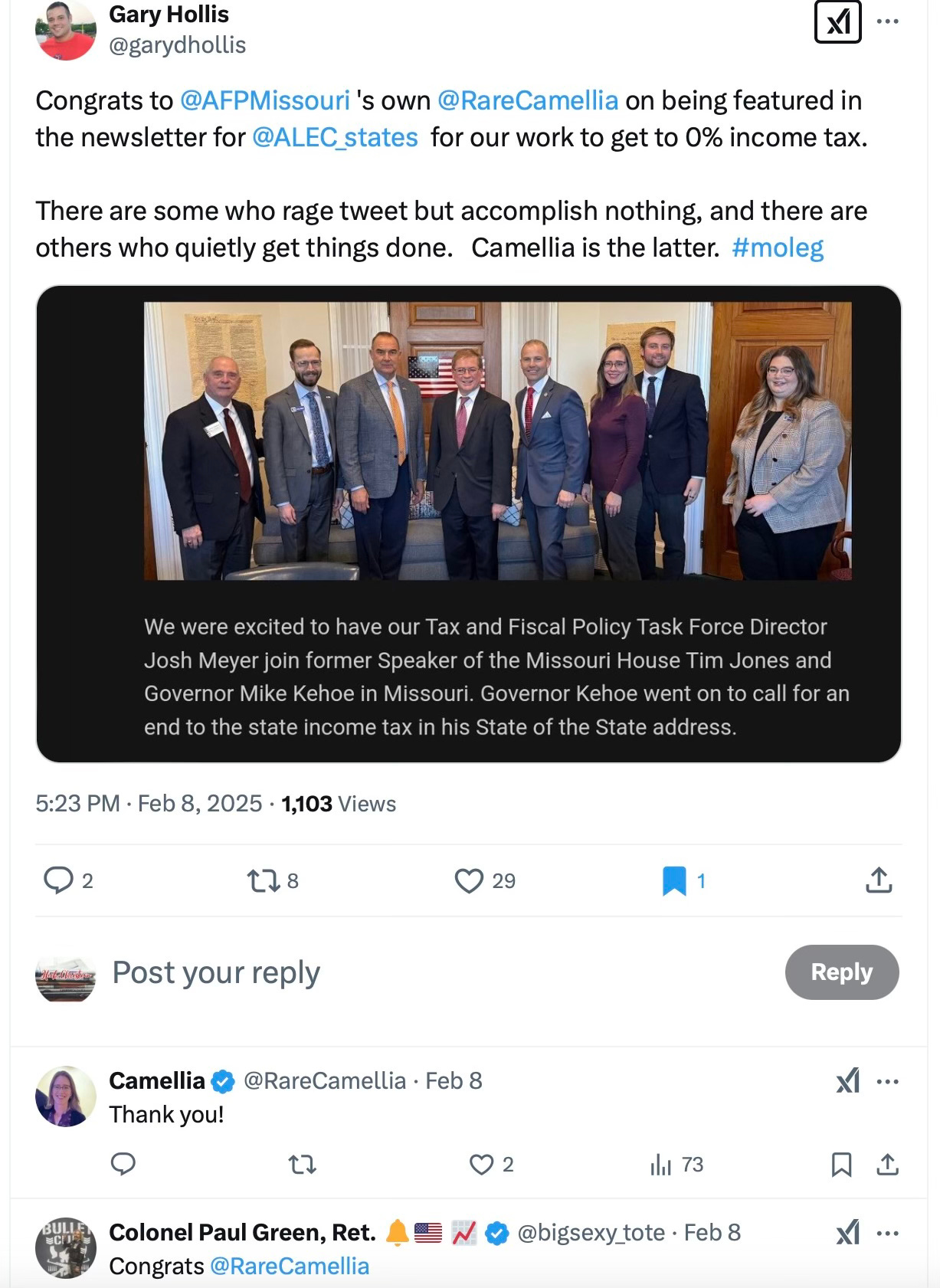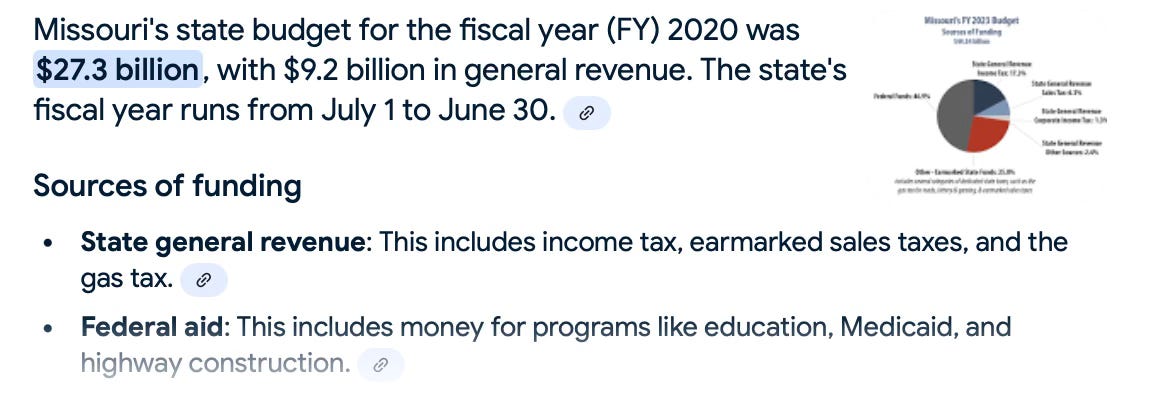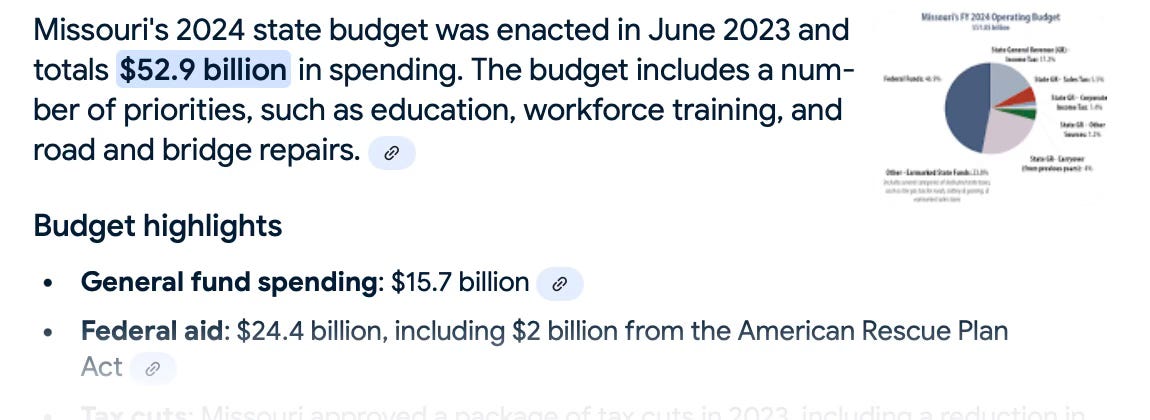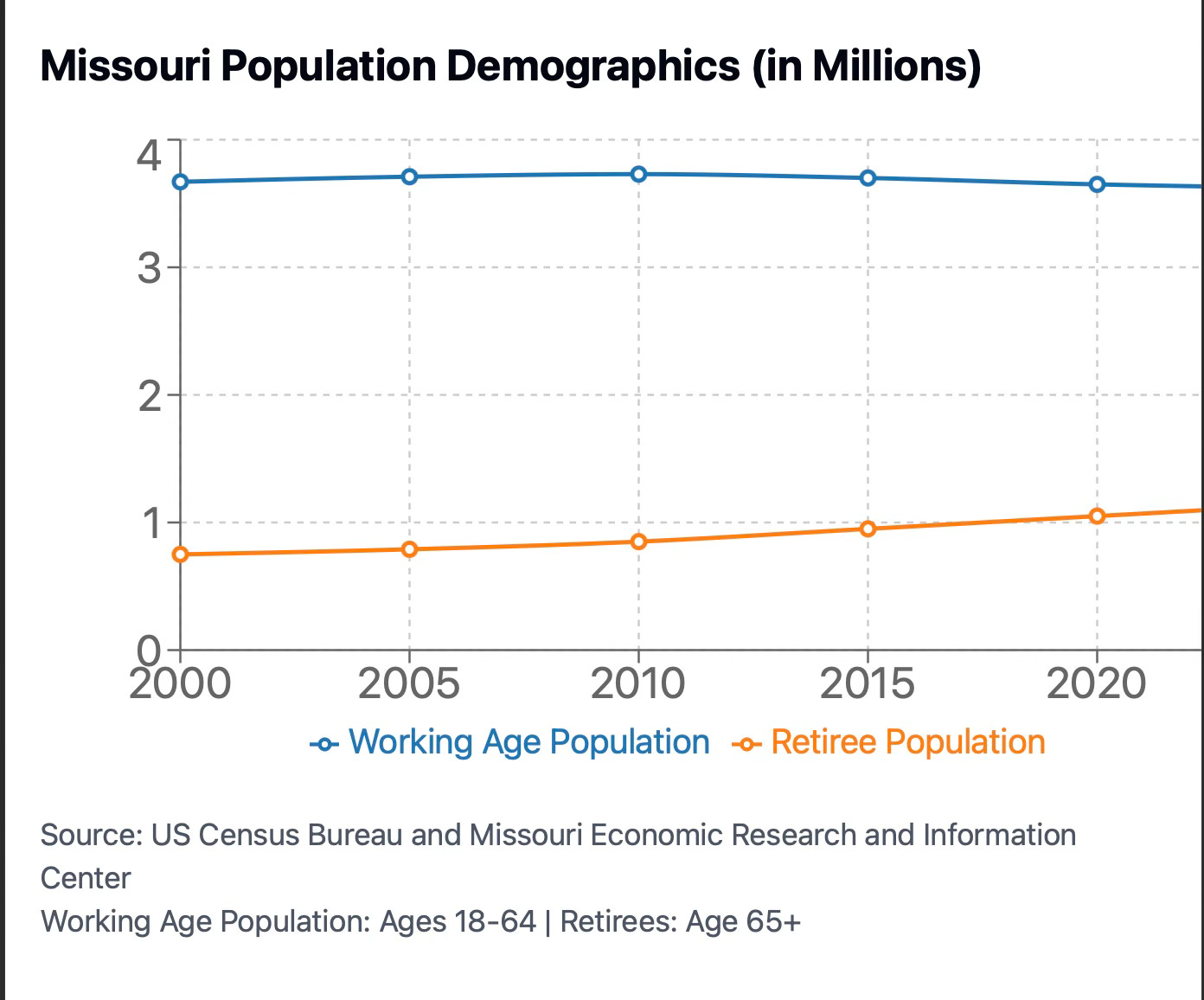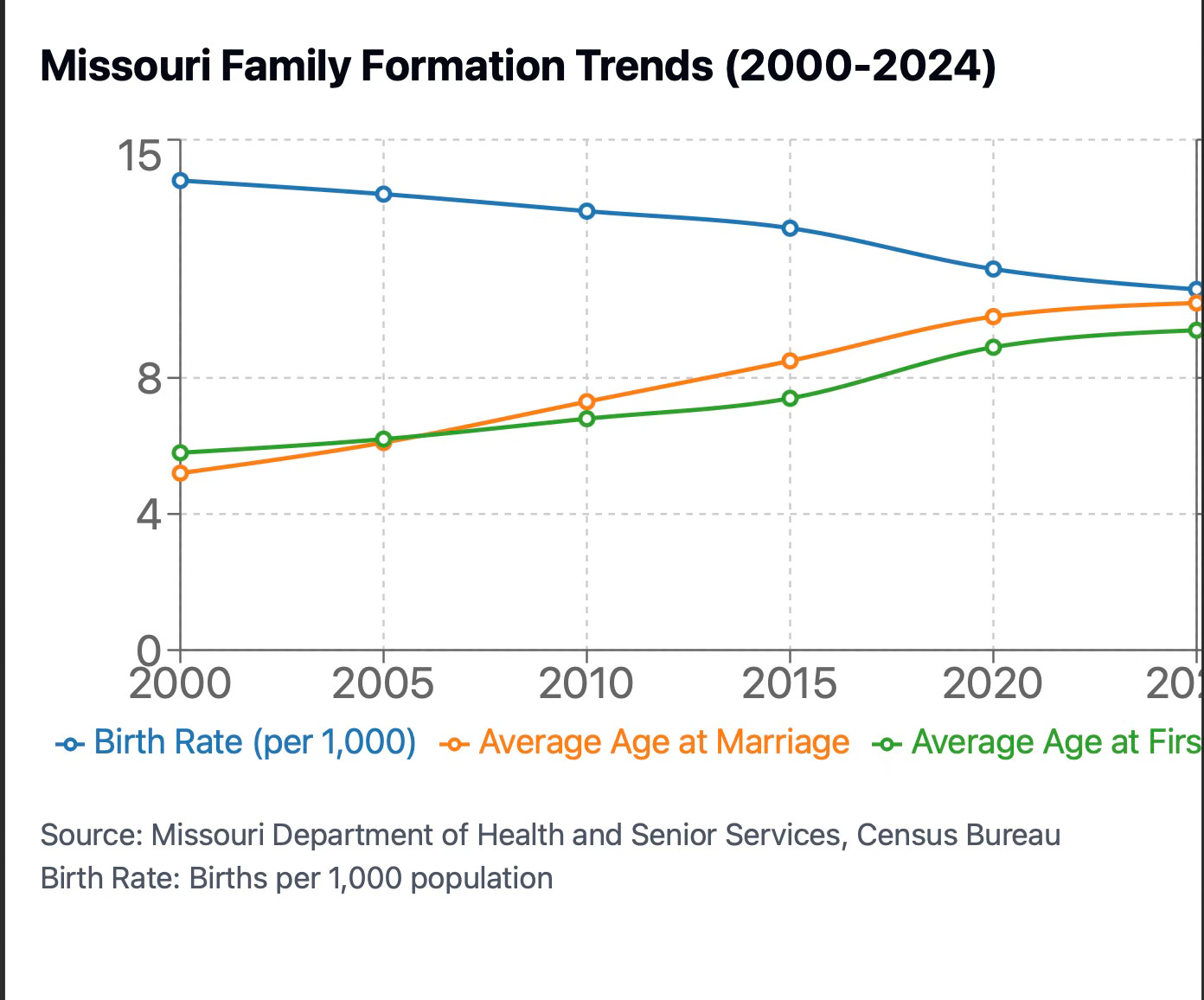From: Broken Believers
"The characteristic of the modern State is that those who appear to govern do not in fact govern. They are constrained by forces which they do not name, which they rarely understand, and which they cannot openly oppose. The result is that public men become timid. They avoid plain speech. They fear exposure more than injustice, and loss of position more than loss of honor. In such a condition courage disappears first, and freedom follows it." -- Hilaire Belloc
By Gretchen Garrity
Pro-life Christians and Christian politicians, still reeling from the 2024 vote to enshrine abortion in the Missouri Constitution, are now being confronted with the issue of how to undo it.
How did it come about that Roe v. Wade was overturned on June 24, 2022 but abortion in Missouri was voted in on Nov. 5, 2024? In 2022, Missouri had immediately acted on the overturning of Roe v. Wade by means of a trigger ban, which effectively outlawed abortion except to save the life of the mother.
Less than 24 months later, a well-organized and well-funded campaign to allow for the legal murder of pre-born persons was conducted and passed in Amendment 3. The pro-life response was to provide a new and improved Amendment 3 added to the November 2026 ballot. The ballot language is as follows:
“Shall the Missouri Constitution be amended to:
Repeal the 2024 voter-approved Amendment providing reproductive healthcare rights, including abortion through fetal viability;
Allow abortions for rape and incest (under twelve-weeks’ gestation), emergencies, and fetal anomalies;
Allow legislation regulating abortion;
Ensure parental consent for minors’ abortions;
Prohibit gender transition procedures for minors?
State governmental entities estimate no costs or savings. Greene County estimates it may experience an unknown increase in tax revenue. Other local governmental entities estimate no costs or savings."
The ballot language purports to make clear exactly what your Yes or No vote would mean. Let's examine it more closely.
The language is couched in such terms that a Yes vote seems to bring more restrictions on abortion. But does it accomplish the end of abortion? Does it really restrict abortion?
Issue No. 1: Does the new and improved Amendment 3 curtail or restrict in any way chemically-induced abortions, which comprise about 63% of abortions nationally?
The simple answer is NO, chemical abortions wherein the mother takes an abortion pill and aborts her baby at home, is not addressed in the new Amendment 3. At this time there is no legislation in Missouri that regulates this type of abortion, and under reporting of these abortions is common.
Issue No. 2: How is rape of minors construed for the purposes of abortion in the new Amendment 3?
Because a minor (anyone under 18) cannot legally consent to sexual relations, all babies conceived by minors can be considered the result of rape and thereby aborted.
Issue No. 3: "Ensures parental consent for minors' abortions" is an addition designed to fool voters. According to an article in the Missouri Independent, "Missouri’s parental consent law requires a minor attempting to access abortion receive at least one parent’s consent. The other parent must also be notified. If that’s not possible, they can also ask a judge to bypass the requirement." Read the article to see how deeply invested some groups are in ensuring your teen can get an abortion without your consent.
That clause is added to convince
voters that the "improved" Amendment 3 is adding something new. It is
not. Amendment 3 ensures
nothing for parental consent that was not already in Missouri law.
Issue No. 4: What is meant by "emergencies" in the ballot language?
According to the actual proposed language of Art. 1, Section 36(a), which will replace Section 36.1 of the Missouri Constitution should Amendment 3 be approved, a medical emergency is "a condition that, based on reasonable medical judgment, so complicates the medical condition of a pregnant woman as to necessitate the immediate termination of her pregnancy to avert the death of the pregnant woman or for which a delay will create a serious risk of substantial and irreversible physical impairment of a major bodily function of the pregnant woman. A medical emergency shall include, but not be limited to, an ectopic pregnancy at any point following the diagnosis of such and treatment for a miscarriage;"
First, ectopic pregnancies do not end in abortion because such pregnancies are not viable. According to The Heritage Foundation, "Treating an ectopic pregnancy is different from having an abortion. Abortion is an intentional, unnatural procedure that kills the baby in the womb. An ectopic procedure, in contrast, attempts to save the life of both mother and unborn child. A number of treatment options are available, but each seeks to separate the embryo from the fallopian tubes."
The treatment is not considered an abortion, so why was this included in the language of Amendment 3? If you want to get down to brass tacks, this kind of language is a form of witchcraft, because it seeks to manipulate the citizen to believe and vote a certain way.
Would a medical emergency be considered a woman who is depressed or suicidal? Would a gallbladder attack be considered a major bodily function that was impaired? One can see there will be no end to the medical emergencies upon which an abortion doctor can have "reasonable medical judgment."
Additionally, the term "under twelve weeks' gestation" is included only for instances of rape and incest. Abortion for "emergencies" and "fetal anomalies" is not restricted to a gestational range. It is stated in the fair ballot language but that has no binding legal effect. So again, witchcraft is employed with misleading information in the fair ballot language that is not in the actual wording of the ballot or the amendment.
There's more. Is an examination legally required to determine the age of the pre-born baby? According to Missouri law, Missouri Revised Statutes § 188.030.2(1), yes "Except in the case of a medical emergency." There's that term again. Medical emergency. One can imagine the abortion industry will find many such emergencies if Amendment 3 is passed.
Issue No. 5: Are there guardrails in the new Amendment 3 for determining a rape occurred? No. There are no provisions in the proposed Amendment 3 or any current Missouri statutes. There is NO requirement to provide proof of rape. There does not need to be a police report, a physical examination or any other threshold in order to procure an abortion. A woman can simply assert that a rape happened and procure an abortion.
Are you beginning to see how voters are manipulated?
Issue No. 6: Abortions will be publicly funded. Though not noted in the ballot wording, when looking at the actual amendment language you will find: "No public funds shall be expended for the purpose of performing, inducing, or otherwise assisting any abortion, except in cases of medical emergency, rape, or incest, as otherwise authorized by law." So, yes pro-life taxpayer, you will be paying for abortions if Amendment 3 passes. Medical emergencies, rapes, incest and 'otherwise authorized by law' will "necessarily skyrocket" (to quote a former President) when the abortion industry is involved.
Issue No. 7: Amendment 3 tacked on the following clause, "Prohibit gender transition procedures for minors." Currently, Missouri has banned "gender transition surgeries, cross-sex hormones and other gender-affirming care for minors." The ban is due to expire in 2027. A good question to ask legislators who allow for temporary laws, is WHY? What political advantage is there by voting for temporary laws regarding children's health and welfare? And WHY tack on vague, lawyerly wording onto Amendment 3? Again, it's there to fool voters and lull them into a sense that some good is being done when it is not.
Are you feeling the chaos and confusion yet?
Sen. Mike Moon aptly describes the dilemma. He says, "Whether your decision to vote ‘yes’ or ‘no’ likely depends upon how much you trust in government. How often have you seen the government enact a law (or, the people amend the constitution) and return to make additional changes after the law was passed (or, amendment adopted)?
I imagine the same action or inaction will occur with Amendment 3 (2026). In my short 13-year experience in the MO General Assembly, I have witnessed a strong reluctance to re-visit the ‘hard’ topics in back-to-back sessions. Although, we’ve been told that when Amendment 3 (2026) passes, “we’ll come back and make the necessary changes” (to remove the exceptions for rape, incest, and fetal anomalies).
The reality (again, my opinion) is that many of the ‘promise makers’ will be long gone from the legislature after the 2026 session, so they will have no ‘dog in the hunt’."
Do read and subscribe to Sen. Moon's Report. He goes into detail about the sausage-making that happens in Jefferson City, and how a permanent solution to outlawing abortion in Missouri has been stopped by the likes of President Pro Tem Cindy O'Laughlin, who is aptly satirized HERE.
The Moral Implications for Christians
Legislators and presumed pro-life organizations who are pushing for a yes vote on Amendment 3 argue that some babies will be saved by the new A3. Is it true? Based on just the few arguments presented above, it is hard to imagine justifying the murder of many small persons in the hopes that a few may be saved.
There is not one single Bible verse that justifies killing babies in abortions.
— Stop Abortion Now (@LifeNewsToo) February 1, 2026
Is the language and intent of Amendment 3 justified in scripture? Paul addresses this issue in Romans.
"And why not say (as some people slander us by saying that we say), ‘Let us do evil so that good may come’?" (Rom. 3:8).
The JB Phillips translation explains this concept more fully:
"It is like saying that if my lying throws into sharp relief the truth of God and, so to speak, enhances his reputation, then why should he repay me by judging me a sinner? Similarly, why not do evil that good may be, by contrast all the more conspicuous and valuable?...But, of course, such an argument is quite properly condemned."
The foundational Scripture that prohibits murder is Ex. 20:13, "Thou shalt not kill." There is no room for exceptions to murder. Jesus reiterated this commandment in the Gospel of Matthew, "...but if thou wilt enter into life, keep the commandments...Thou shalt do no murder, Thou shalt not commit adultery, Thou shalt not steal, Thou shalt not bear false witness..." (Matt. 19:17-19)
Nowhere in Scripture is it permissible to do evil that good may come. Nowhere is it suggested that Christians should compromise with or promote some murders so that other murders may possibly be averted. This type of mixture was condemned by Christ in Revelation when He confronted the compromising church at Pergamos. The Christians there had begun compromising with the pagan culture. They were apparently mixing Christian and pagan practices, and worse, some were teaching other Christians to do so also.
When pro-life groups run incremental legislation in red states, they delay the abolition of abortion.
— Ben Zeisloft (@BenZeisloft) February 2, 2026
There are more than a dozen states with Republican governing trifectas and legislative supermajorities. Planned Parenthood and the Democrats have no ability to stop these states…
Amendment 3 is a compromise with evil through the concept of Incrementalism. It is not a valid argument in terms of obedience to God's command to 'do no murder'. It can be implied in other things, such as implementing a plan to reduce taxes, or the phasing of a building plan. It is not valid to compromise on clear moral instruction from Scripture.
Satan greatly desires to "sift" Christians, to shake them loose from the foundation of Christ. A local pastor I know has said, "In matters of truth there is no compromise."
For a Christian to vote yes to murder certain unborn persons is a type of satanic compromise. It promises that by doing evil, good may come. Christians are accountable to God for their votes. Scripture is clear, murder is not permissible.
The Solution
The pro-life movement has been deeply subverted by those who compromise with the pagan concept of child murder. Organizations like Missouri Right to Life are content to allow the sacrifice of children while hiding under the cover of incrementalism. Instead of supporting personhood and equal protection bills that would effectively make abortion a crime, they now fight tooth and nail to prevent the criminalization of murder through abortion. Murder is a crime no matter who commits it or how small the victim.
You must understand that the leaders of the Pro-Life Movement are pro-choice liberals.
— James Silberman (@JSilbermanFTS) January 30, 2026
This is not distinguishable in any sense from how Planned Parenthood will oppose this bill. https://t.co/xiYeYTms2F
It is time for our legislators to SUPPORT, HEAR, and PASS a personhood or equal protection bill in Missouri. This would essentially stop abortion. Our leaders must be willing to lead and govern as they were elected to do.
That politicians like House Majority Leader Jon Patterson and President Pro Tem Cindy O'Laughlin continue to obstruct the bills put forth to abolish abortion is a disgusting stain on the now infamous GOP Super Majority in Missouri. Compromised GOP legislators continue to put forth and support amendments like A3, indicating a captured party that is at the mercy of "forces which they cannot openly oppose." They are willing victims of witchcraft--the manipulation of their minds and souls--in order to accomplish evil.
Below are bills currently introduced in the Missouri Legislature, as well as the language of A3 that will be added to our state constitution should A3 pass. It must be noted that any of the bills below would have dramatic effect on ending abortion in Missouri.
Personhood resolutions ( From Abolish Abortion Missouri):
HJR 109 filed by Representative Burt Whaley
SJR 72 Filed by Senator Mike Moon
Equal Protection Bills:
HB 1682 Filed by Representative Burt Whaley
SB 951 Filed by Senator Mike Moon
Additionally a repeal for Amendment 3 has been filed:
SJR 107 Filed by Senator Mike Moon
FULL TEXT OF THE PROPOSED AMENDMENT
If Amendment 3 is passed, the following language will replace Section 36.1:
Section 36(a).
1. The state's duty to protect public health and welfare includes protecting the integrity and ethics of the medical profession. The state's interest in regulating the practice of medicine is even greater in areas of medical and scientific uncertainty or in areas that raise grave moral and ethical concerns, including abortion and gender transition procedures.2. An
abortion may be performed or induced upon a woman in cases of medical
emergency, fetal anomaly, rape, or incest. In the case of abortions
performed or induced in cases of rape or incest, the abortion may be
performed or induced no later than twelve weeks gestational age of the
unborn child.
3. The general assembly may enact laws
that regulate the provision of abortions, abortion facilities, and
abortion providers to ensure the health and safety of the pregnant
mother. These laws shall include, but not be limited to, laws requiring
physicians providing abortion care to have admitting privileges at a
nearby hospital; laws requiring facilities where abortions are performed
or induced to be licensed and inspected for clean and safe conditions
and adequate instruments to treat any emergencies arising from an
abortion procedure; laws requiring physicians to perform a sufficient
examination of the woman to determine the unborn child's gestational age
and any preexisting medical conditions that may influence the
procedure; and laws requiring ultrasounds to be performed only by
physicians or licensed medical technicians.
4. No
abortion shall be performed or induced upon a woman based on a prenatal
diagnosis, test, or screening indicating a disability in an unborn
child, except in cases of a fetal anomaly.
5. No public
funds shall be expended for the purpose of performing, inducing, or
otherwise assisting any abortion, except in cases of medical emergency,
rape, or incest, as otherwise authorized by law.
6. Except in cases of a medical emergency in which consent cannot be obtained, no abortion shall be performed or induced upon a woman without her voluntary and informed consent, given freely and without coercion. In the case of a minor under the age of eighteen years who is not emancipated, no person shall knowingly perform or induce an abortion, except in cases of a medical emergency in which consent cannot be obtained, unless the attending physician has obtained:
(1) the written consent of the minor and a parent or legal guardian; and
(2) documentation of the consent is retained in the minor's medical record. Licensed medical physicians shall be required to provide women with medically accurate information. The general assembly may enact laws to provide for the right of a minor to consent to an abortion as granted by a court order.7. Fetal organ harvesting after an abortion is not permitted under any circumstances.
8.
A woman's ability to access health care in cases of miscarriages,
ectopic pregnancies, and other medical emergencies shall not be
infringed by the state.
9. No gender transition
surgeries shall be knowingly performed on children under eighteen years
of age, and no cross-sex hormones or puberty-blocking drugs shall be
knowingly prescribed or administered for the purpose of gender
transition to children under eighteen years of age. The provisions of
this section shall not apply to the use of such surgeries, drugs, or
hormones to treat children born with a medically verifiable disorder of
sex development or to treat any infection, injury, disease, or disorder
unrelated to the purpose of a gender transition.
10.
Any action challenging the validity of any state law relating to
reproductive health care shall be brought in the Circuit Court of Cole
County, Missouri. If a pleading, written motion, or other paper drawing
into question the constitutionality of a state statute does not include
the state, one of its agencies, or one of its officers or employees in
an official capacity, the party bringing the action shall file a notice
of constitutional question and serve it on the attorney general and the
attorney general shall have the right to intervene in the litigation.
11. The general assembly shall have the authority to enact laws to carry out the provisions of this section.
12. As used in this section, the following terms mean:
(1) "Cross-sex hormones", testosterone, estrogen, or other androgens given to an individual in amounts that are greater or more potent than would normally occur naturally in a healthy individual of the same age and sex;
(2) "Fetal anomaly", a structural or functional abnormality in the unborn child's gestational development that would make life outside the womb impossible;
(3) "Fetal organ harvesting", collection of fetal tissue, organs, or fluids, including any biological material, for the purpose of selling or collecting for scientific purposes, but shall not include the utilization of fetal tissue, organs, or fluids to determine the cause or causes of any anomaly, illness, death, or genetic condition of the unborn child, the paternity of the unborn child, or for law enforcement purposes;
(4) "Gender transition surgery", a surgical procedure performed for the purpose of assisting an individual with identifying with and living as a gender different from his or her biological sex;
(5) "Medical emergency", a condition that, based on reasonable medical judgment, so complicates the medical condition of a pregnant woman as to necessitate the immediate termination of her pregnancy to avert the death of the pregnant woman or for which a delay will create a serious risk of substantial and irreversible physical impairment of a major bodily function of the pregnant woman. A medical emergency shall include, but not be limited to, an ectopic pregnancy at any point following the diagnosis of such and treatment for a miscarriage;
(6) "Puberty-blocking drugs", gonadotropin-releasing hormone analogues or other synthetic drugs used to stop luteinizing hormone secretion and follicle stimulating hormone secretion, synthetic antiandrogen drugs to block the androgen receptor, or any other drug used to delay or suppress pubertal development in children for the purpose of assisting an individual with a gender transition;
(7) "Reasonable medical judgment", a medical judgment that would be made by a reasonably prudent physician, knowledgeable about the case and the treatment possibilities with respect to the medical conditions involved.13. All provisions of this section are severable. If any provision of this section is found by a court of competent jurisdiction to be unconstitutional or unconstitutionally enacted, the remaining provisions of this section shall be and remain valid.



